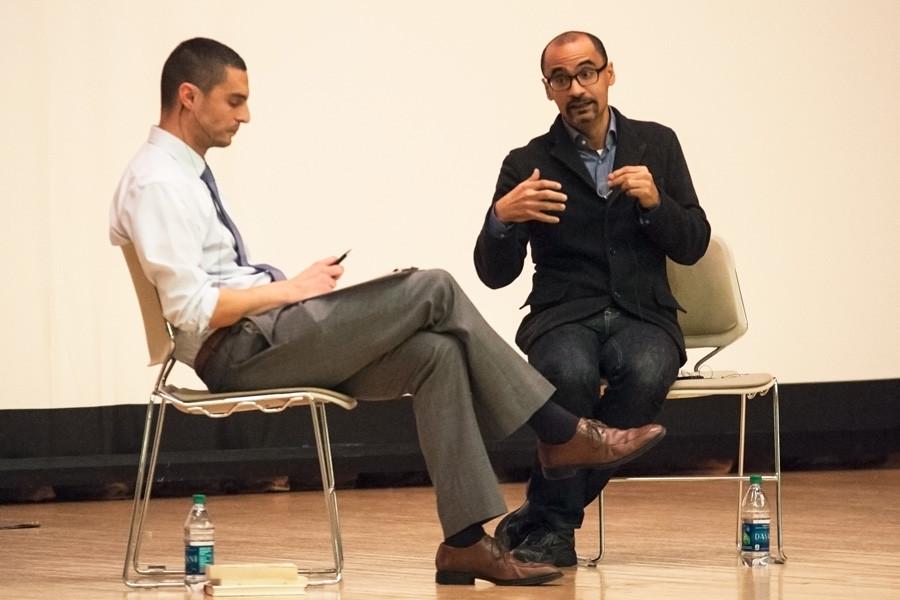Pulitzer Prize-winning author Junot Diaz discusses his experience as an immigrant
Jeffrey Wang/The Daily Northwestern
Pulitzer Prize-winning author Junot Diaz (right) speaks about the importance of compassion in overcoming immigrant challenges. His talk, held at Ryan Family Auditorium on Thursday, was moderated by English Prof. John Alba Cutler.
January 29, 2016
Immigrants of this generation should dig deeper into their parents’ experiences in order to comprehensively understand their identity, Pulitzer Prize-winning author Junot Diaz said in a speech Thursday night.
“You’ve got to know the conflicting stories that might have produced you,” Diaz said. “If the Caribbean can teach us anything, it is that you can build the most powerful creative culture in the world based on fragments.”
The event was part of the Contemporary Thought Speaker Series, a student committee that brings intellectuals across disciplines to campus to speak about their fields. Recent speakers include founder and CEO of Khan Academy Sal Khan and Eva Moskowitz, founder and CEO of Success Academy Charter Schools.
“Junot has always been at the top of our list of someone we wanted to bring,” said CTSS co-chair Ben Zimmermann, a Weinberg sophomore. “His works touch on a lot of really important themes of the day, such as immigration, class differences and ethnicity.”
English Prof. John Alba Cutler moderated the event, attended by more than 500 people, in the Ryan Family Auditorium.
Diaz described his early years as an immigrant to the U.S. — where he was grew up primarily in an African-American community in New Jersey — from the Dominican Republic. Not many people understand more than the general experience of being an immigrant, he said.
“Sometimes, it’s hard to keep in mind even to yourself the kind of excruciating particularities of experience,” Diaz said.
He said cliches and generic narratives about immigrant life sometimes make preserving his own memories difficult, an issue he struggled with as he developed as a writer.
“You have to parse out often how much of cultural shorthand you have brought into your own memory system,” he said. “As an artist, I think that has been part of my journey.”
Although people believe they can undermine white supremacy by raising awareness about immigrants in the U.S., Diaz said doing so often has a negative effect on people’s perceptions of immigrants. He called the racial system in the U.S. “underpinned by fantasy” and therefore resistant to opposing arguments.
Diaz’s works include “Drown,” “This is How You Lose Her” and “The Brief Wondrous Life of Oscar Wao,” which won the Pulitzer Prize for fiction in 2008.
When asked about his novels, Diaz said the final interpretation of a book is up to readers.
“The novel is not mine,” he said. “Every book you read, every poem you read, every article you read, has a blank last page. On that page, you are the person to write the last page of the book. Everybody’s book is different.”
Tsehaye Hebert, an NU alumna who attended the speech, said she was excited to hear Diaz talk because she appreciates his creativity and candor.
“He really tells about a world that some people just don’t know about, an American story if you will,” said Hebert (Communication ’86).
As Diaz spoke about the complexities of immigrant identity and emotional difficulties, he emphasized the value of self-love and compassion. In a society that only values a certain type of identity, immigrants have trouble finding beauty in themselves, he said.
“Ultimately, the revolution against this system is people of color finally achieving self-love,” Diaz said. “The funniest part is that the struggle of ours, in fact, it’s a romance novel.”
Email: jeelee2018@u.northwestern.edu
Twitter: @jennajeeyoung



